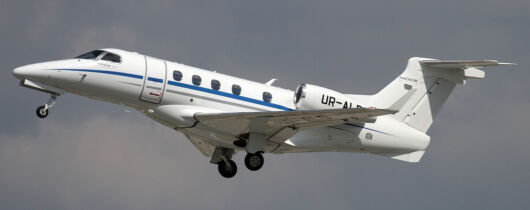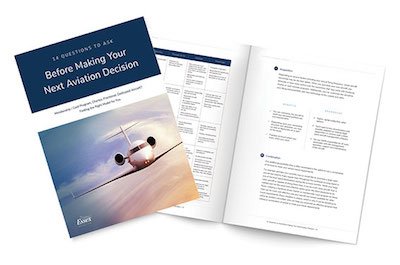
This post was written in collaboration with attorney Chris Younger, a member of HCH Legal, LLC. Chris focuses his legal practice on business aircraft transactions as well as issues relating to federal and state taxation and regulation of business aircraft ownership and operations. Chris is a frequent speaker on business aviation topics and has presented numerous webinars on issues such as bonus depreciation and state sales and use tax. He has also written articles for publications including AvBuyer Magazine and World Aircraft Sales Magazine.
The private aviation industry has experienced increased interest in recent years as a result of federal income tax provisions included in the 2017 Tax Cuts and Jobs Act bill, which initially supported 100% “bonus” depreciation of the cost of new or preowned private aircraft in year one of ownership. In this blog post, we’ll unpack the specifics of this private jet tax law (including changes to the bonus percentage), explain who is eligible for this private jet tax deduction and discuss how to take advantage of this exciting tax benefit while it lasts.
What Is the Private Jet Tax Break?
On December 22, 2017, the Tax Cuts and Job Acts of 2017 (TCJA) was signed into law. The TCJA made substantial amendments to the Internal Revenue Code of 1986. It was intended to reform current corporate income and individual income taxes, as well as move the United States to a territorial system of business taxation.
According to research from the Tax Foundation, the TCJA aimed to:
- Significantly lower marginal tax rates and the cost of capital, thereby leading to a 1.7% increase in GDP over time, 1.5% higher wages and an additional 339,000 full-time equivalent jobs
- Spur an additional $1 trillion in federal revenues from economic growth
- Increase GDP by an average of 0.29% each year
- Increase after-tax incomes of all taxpayers by 1.1% over time
The Private Jet Tax Break refers to a provision within the TCJA that, pre-2022, allowed businesses to write off 100% of the cost of private jets used for business purposes in the year they were purchased. This was part of the broader “bonus depreciation” rule, which aimed to incentivize business investment by enabling companies to deduct the full cost of qualifying assets, such as aircraft, immediately rather than over several years. However, this 100% bonus depreciation has been phasing down since 2023 and is scheduled to be fully eliminated by 2027, unless extended by future legislation.
Ultimately, the TCJA heavily revised tax law with the goal of stimulating the economy, simplifying taxes and lowering the tax burden on businesses in the United States. It’s important to note that the changes to individual income tax provisions contained in the TCJA are scheduled to expire after December 31, 2025.
How the TCJA Affects Private Jet Depreciation Deductions
Prior to the TCJA’s enactment, businesses and individuals were able to immediately deduct 50% of the purchase price of a private aircraft used for business purposes from their taxable income. The TCJA increased the bonus depreciation percentage for certain depreciable assets, including aircraft, to 100% in the first year of their use for business purposes. This meant that aircraft owners were eligible to write off 100% of the cost of an aircraft purchase, including acquisition and maintenance expenses.
Per the TCJA, the bonus depreciation deduction percentage decreases by 20% per year for aircraft placed in service after 2022. So, according to this schedule, aircraft owners were eligible for 100% depreciation from 2017 to 2022, 80% depreciation in 2023 and so on.
Going forward, absent the enactment of another change to the law, private aircraft owners placing an aircraft in service for business use will be eligible for:
- 60% bonus depreciation in 2024
- 40% bonus depreciation in 2025
- 20% bonus depreciation in 2026
- 0% bonus depreciation in 2027
For those considering private aircraft ownership, there are still sizable benefits to utilizing bonus depreciation for aircraft used for business. However, due to the phase down in the bonus depreciation percentage, business aircraft owners should consider whether it makes more sense not to deduct bonus depreciation and, instead, to use the standard Modified Accelerated Cost Recovery System (MACRS) or the Alternative Depreciation System (ADS) to determine the amount and timing of their aircraft-related depreciation deductions.
Private Jet Tax Break Stipulations & Penalties
As with any type of tax break, the private jet tax break comes with certain stipulations, including:
- This tax rule only applies to private aircraft placed in service for business purposes after September 27, 2017 and prior to 2027 (with the caveat that the bonus depreciation percentage is phasing out in 20% increments per year after 2022).
- Bonus (and MACRS) depreciation can be deducted only if the aircraft in question is utilized primarily for qualified business use.
- To avoid the risk of disallowance of all or part of the bonus depreciation deduction — and any additional MACRS depreciation deduction for the remaining basis in the aircraft — in the tax year that the aircraft is placed in service, you should utilize it only for qualified business uses and not for any personal or entertainment-related travel.
- To avoid recapture of any of the claimed bonus depreciation in subsequent years during the remainder of the aircraft’s “straight line” depreciation life, you must utilize the aircraft at 50% of the time for qualified business uses. Other uses of the aircraft during the year can be for non-business purposes.
If you do not follow these stipulations, you could lose the private jet bonus depreciation deduction and be required to recalculate your aircraft-related depreciation deductions to claim them evenly over the aircraft’s depreciable life on a “straight-line” basis using ADS.
For example: If you were currently in year four of ownership but did not follow the qualified business use requirement from the first year of ownership when you claimed the bonus depreciation deduction, you could retroactively lose a significant portion of that deduction and be forced to recalculate it and claim it in subsequent years. An additional challenge with this result is that it can be difficult to manage deduction disallowance rules — such as those applying to business entertainment, personal entertainment and commuting — and how they affect your ability to claim depreciation deductions.
You would also be required to pay the government any interest that accrued on the additional income taxes resulting from any loss of the bonus depreciation deduction. Hefty civil tax penalties could also apply — up to 20%–40% of the increased tax liability resulting from a disallowance of the claimed bonus depreciation deduction. In any case, whatever the consequence, legal and accounting fees associated with defending a tax audit relating to such a violation of the listed property rules can add up quickly. That’s why it is important to work with an expert tax advisor when exploring these enhanced private jet depreciation opportunities.
Which Form of Private Jet Depreciation Makes Sense for You?
There are certain situations in which it’s inadvisable to claim the TCJA private jet bonus depreciation, such as:
- If the buyer anticipates that they will not meet qualified business usage requirements for every year of the aircraft’s class life (which is typically six years for a business aircraft that is not used primarily for charter purposes). In this case, it may be better to elect out of both bonus and MACRS (accelerated) depreciation and instead use ADS (straight-line) depreciation to avoid the risk of recapture of excess bonus depreciation deductions and any related interest and penalties.
- If the intended usage in the year that the bonus depreciation deduction will occur will result in disallowance of all or part of the bonus depreciation deduction.
- If the buyer does not have sufficient ordinary income to offset with the bonus depreciation deduction.
- If the buyer is offsetting capital gains. The amount of “recapture” gain relating to prior depreciation deductions upon the sale of the aircraft is treated as ordinary taxable income and is taxed at higher rates than the capital gains income that was previously offset with the bonus depreciation deduction.
In these instances, it may make more sense for buyers to use either MACRS or ADS depreciation; note that the same rules that apply to bonus depreciation deductions also apply to MACRS deductions.
How to Make the Private Jet Tax Cut Work for You
If you’re interested in taking advantage of the private jet tax deduction, start by retaining the services of a private aviation consultancy. A private aviation consultant, such as those at Essex Aviation Group, will not only help you determine which private aircraft make and model best meets your unique travel needs but will also help you to understand which type of operations can meet your requirements and still enable you to take advantage of the federal income tax benefits provided in the revised tax code.
A private aviation consultant can also leverage their industry connections to put you in contact with aviation-specific legal and tax advisors who will work with your in-house representation to:
- Evaluate state sales tax and use tax rates and available methods for avoiding or reducing such taxes
- Structure aircraft ownership and operations
- Maximize aircraft utilization
- Determine aircraft costs and taxation, including income tax planning
- Ensure excise tax compliance
- Handle monthly statements and reporting to track expenses
- And so on
A highly qualified aviation tax advisor will collaborate with your in-house team to set up a cohesive plan that achieves the best state sales and use tax results and income tax results and avoids creating any other tax liabilities.
Should you purchase a private jet only to discover that you aren’t eligible to take advantage of these income tax benefits, your private aviation consultant will work with you to explore options to address this issue, such as a leaseback. A leaseback enables you to sell the asset to a bank, and then turn around and lease that aircraft back from the bank. This can be an ideal solution for individuals who would like to use the aircraft for personal, entertainment-related purposes because it enables the bank to take advantage of the tax benefits that the individual is not able to utilize and provide the individual with a discounted lease rate as a result of the bank’s ability to utilize those tax benefits.
If you’d like to learn more about how the Tax Cuts and Jobs Act of 2017 affects private aviation, or how you can take advantage of the private jet tax deduction, contact the experts at Essex Aviation to schedule a consultation.
Frequently Asked Questions
Is bonus depreciation still available for private jet purchases?
Yes, bonus depreciation is still available for private jet purchases in 2024, but it has begun to phase down. Under the Tax Cuts and Jobs Act (TCJA) of 2017, businesses were allowed to write off 100% of the cost of private jets used for business purposes in the year of purchase. However, starting in 2023, the percentage of bonus depreciation has been reduced and will continue to decrease each year until it is fully phased out by 2027, unless new legislation extends the provision.
What is the schedule for bonus depreciation on private jet purchases?
The schedule for bonus depreciation on private jet purchases is as follows:
● 2018–2022: 100% bonus depreciation
● 2023: 80% bonus depreciation
● 2024: 60% bonus depreciation
● 2025: 40% bonus depreciation
● 2026: 20% bonus depreciation
● 2027 onward: 0% (unless the provision is extended)
This gradual reduction means businesses can still benefit from the tax break, but at decreasing rates.







